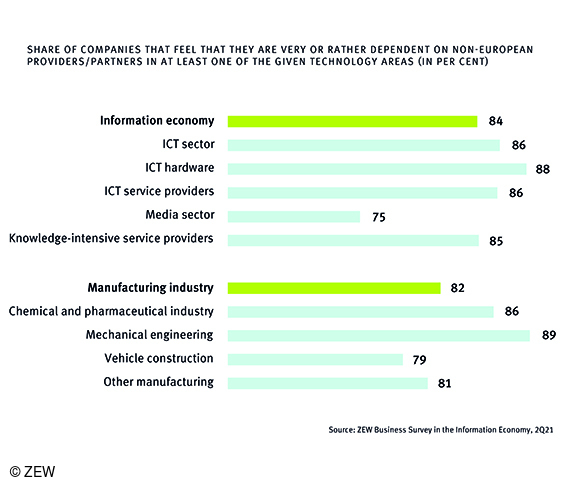Lack of Digital Sovereignty Threatens Competitiveness of German Companies
ResearchGermany and Europe are lacking digital sovereignty. This jeopardises the ability of the German economy and its European partners to respond effectively to future challenges, to innovate and to remain competitive. This is the result of a study by ZEW Mannheim, which is based on a comprehensive evaluation of the existing literature and a representative company survey. On behalf of the Federal Ministry for Economic Affairs and Energy, ZEW researchers surveyed more than 1,200 companies from the information economy and manufacturing industry.
According to the survey, more than 80 per cent of German companies feel that they are very or rather dependent on non-European providers and partners in at least one technology area. How problematic this can be is shown by the recurring discussion about security concerns regarding Chinese providers and the monopoly-like position of some US tech giants. In addition, supply bottlenecks for semiconductors can lead to considerable production losses. So why not switch to European providers? Often this option does not exist. The most frequent reasons given by the companies surveyed for the existing dependency are the fundamental lack of an alternative in the European Union or the superiority of other, non-European providers. For the German economy, the elimination of existing dependencies in the technological field is therefore crucial for the future.
Existing literature indicates that for the economy to be digitally sovereign, it must ensure the availability of and access to appropriate digital technologies and data. For this, either the development of digital technologies at home or unrestricted access to these technologies, even in times of crisis, must be guaranteed. Therefore, manufacturing and development skills of German and European companies in relevant technology fields and in key technologies are of central importance. Only in this way can the availability of technologies be guaranteed and the digitalisation of the economy be shaped in the spirit of European legal concepts and values. However, this does not mean becoming completely self-sufficient in all (technological) areas and producing solutions exclusively in one’s own country (i.e. protectionism). Rather, it is about the ability to shape the digital transformation in terms of hardware, software, services and competencies in a self-determined way. So far, however, only one in two German companies has heard of the term “digital sovereignty”. Nevertheless, the ZEW survey shows that companies attach great importance to this topic in the long term. In particular, data sovereignty is rated as important by 90 per cent of companies in the information economy and 84 per cent in manufacturing. “The German economy has some strengths under its belt, such as provider competencies in the area of IT security. But there is still room for improvement in many areas,” notes Dr. Mareike Seifried, ZEW economist and author of the study.
European alternatives are often missing
The survey further shows that more than 80 per cent of German companies feel that they are dependent on technologies from non-European providers and partners. Large companies tend to feel more dependent than small ones, which have significantly fewer non-European partners and can change providers more flexibly. The most frequent reasons given by the companies surveyed for the existing dependency are the fundamental lack of an alternative in the European Union or the superiority of other providers. “In the relevant technology fields and key technologies, German and European companies must build up their own manufacturing and development skills. This is of central importance in order to help shape the digitalisation of the economy in the spirit of European legal concepts and values,” states ZEW economist Seifried. So far, only about a 25 per cent of the respondents are planning measures to reduce their own dependence. There is a lack of alternatives or knowledge about possible solutions, such as open source solutions.
German companies want shape their digital sovereignty in a self-determined way
In order to strengthen Germany’s and Europe’s digital sovereignty, it is necessary to reduce information deficits and keep an eye on the dynamic risks of becoming dependent. Businesses and politics must be agile and act in cooperation. “We should build on existing strengths and invest in particular in future-oriented key technologies such as quantum computing, artificial intelligence and IT security. Projects such as the European cloud and data ecosystem GAIA-X should be implemented promptly. Both the regulatory and social framework also need to be strengthened,” Seifried sums up. “Digital skills are essential and need to be built up and developed in order to achieve digital sovereignty.”
